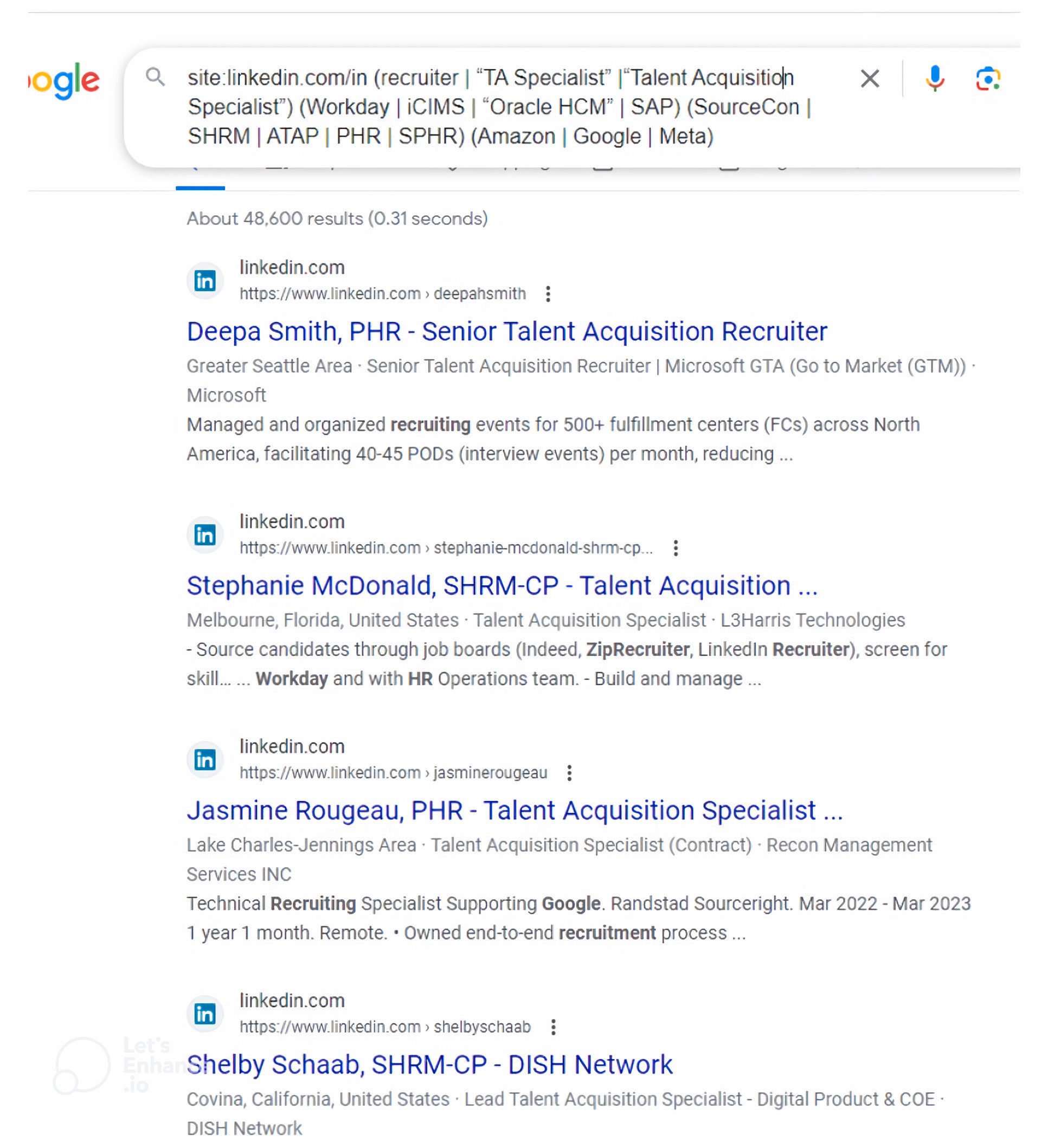When learning Boolean basics, we rarely discuss where or how to find the words to put in the string. It is often assumed you already know this, but what if you don’t? How do you learn what keywords you should put in your string?
Ask the Hiring Manager – The Intake Call
-
- Ask about other titles; how are these titles written on a resume/profile? Any abbreviations?
- Example: TA vs. Talent Acquisition OR HR vs. Human Resources can all be found on a recruiter profile/resume.
- Ask about skills. What skills will they need to be successful in the role? Are there any abbreviations for these skills? If they have this, then they have that?
- Example: If they have HR Phone Screen Skills, they most likely have interviewing skills and vice versa.
- Example: ATS Skills vs “Applicant Tracking System” Skills
- Ask about the technology they will be using.
- Example: A recruiter may not specifically list that they have ATS or CRM skills but may list the ATS and/or the CRMs they have worked with. Capture it all. (Workday, SAP, iCIMS, Oracle HCM)
- Ask about the day in the life. What type of projects will they be working on? What will be their responsibilities on the projects?
- Example: Source, Screen, Schedule Interviews, Recruitment Strategy
- Ask about any certifications, Associations, Networking groups, etc. Learn where someone who is a good fit goes to connect and learn. Understanding what certifications they may have can help you identify top performers and professionals passionate about the work they do.
- SourceCon, SHRM, ATAP, SPHR, PHR
- Ask about companies to target
- Amazon, Google, Meta
- Ask about other titles; how are these titles written on a resume/profile? Any abbreviations?
Basic Boolean Operators To Know:
AND + (you can use + in instead of AND)
OR | (you can use the | in instead of OR)
” ” (ensures you search for exact phrases)
( ) (use this to group similar terms/keywords together)
Tip 1: Remember that Google limits your characters to 32 words.
Tip 2: When using these strings in LinkedIn Recruiter searches, you must replace the | with OR.
Here is an example of a few different strings you could create from the above intake call:
(recruiter | “TA Specialist” | “Talent Acquisition Specialist”) AND (“phone screen” | interview) (ATS | “Applicant tracking system” | CRM |”customer relationship management”) (source | “identify candidates” | “recruitment strategy” | sourcing)
(recruiter | “TA Specialist” |”Talent Acquisition Specialist”) (Workday | iCIMS | “Oracle HCM” | SAP) (SourceCon | SHRM | ATAP | PHR | SPHR) (Amazon | Google | Meta)
It is essential to note that each subject/question has its own brackets/parenthesis. This is called nesting. Grouping similar words into OR statements in their own brackets is very important. This is how you can expand the number of profiles you find in your results vs. limiting.
AND statements limit the results
OR statements expand the results.
Add and remove things as you see fit to get the best results. Sometimes, too many words can be too limiting, and fewer words can create too many results. Start with the must-haves, and then add the nice to-haves.
Do your Research
- Do skills-based searches to look at their titles. Search for profiles by skills only. What are some of the titles you are finding that have the skills you are looking for?
- Search by titles. What are the different ways people are showing the skills you are searching for?
- Google conferences, associations, and certifications for the ideal professionals you seek — Research top technologies they use to do their jobs.
- ChatGPT – ask ChatGPT all of these questions.
- Pull up resumes and profiles for people in the roles today. Where did they come from? What were their previous titles? How are they showing the skills you are searching for? What certifications do they have? What associations are they a part of?
- Go to the association and networking pages; how are they describing this work?
It is essential to do both when creating your Boolean keywords. Ask the hiring manager and do your own Research. Sometimes, you can learn a lot from doing your own Research.
There are a lot of other search words that you can use to find talent I did not include in this article, such as Education, Awards, Sororities, Fraternities, Competitors, alternate locations your HM is willing to hire in, researching surrounding cities, nearby rural areas and metropolitans for the desired city of choice.
There are many options, but the best thing to remember is understanding how people list them on their profiles and resumes. Make sure you align with this, and you will do great!
Example: Someone can manage projects and not have a project manager title. Make sure you are writing a variety of strings for your searches, capturing the various ways people share their experiences and skill sets.
“project manager” VS (lead OR manage OR direct) AND Projects
You can use the strings in various places (Google, Bing, Duck Duck Go, LinkedIn, and many more!) Remember to add your commands when searching the various search engines.
Boolean Commands
- SITE: (This operator allows you to restrict your search to a specific site or domain.)
- FILETYPE: (This operator helps you find a target page with a particular file extension; for example PDF.)
- INTITLE: (This operator finds web pages containing specific words in a page’s title.)
- INURL: (This operator finds pages that contain a certain word (or words) in their URL.)
Here is a screenshot of everything being pulled together via a search on Google.

Remember to test it and switch it up often!
